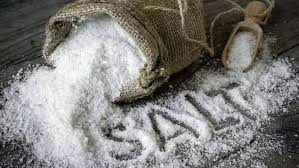The U.S. salt market size was valued at $4.12 billion in 2023. Salt is a mineral found in seas and has various industrial uses, including de-icing, water treatment, and chemical manufacturing. In chemical manufacturing, it is essential for producing soda ash, chlorine, and other chemicals. Additionally, salt is widely used for de-icing roads in colder U.S. regions during winter, contributing to market growth. The steady demand for salt in the food industry also supports overall market expansion. Lithium is also extracted from salt mines and has seen an increase in demand with the growth of the battery industry.
In 1869, B. F. White and J. H. Stump began operating commercial salt works at the head of Salt River, northeast of Soda Springs. Salt was purchased locally and in nearby towns like Fort Hall and Soda Springs, but salt was needed for more than just food preservation. Mines needed salt in far larger quantities than the pioneers. The nearby gold rush town of Caribou City needed salt and for some years, most of the salt used in Montana smelters was furnished from the Oneida Salt Works. J. H. Stump ran the salt works on the creek in Star Valley that carries his surname. The mine produced as much as 1.5 million pounds of salt in the late 1800's. B. F. White traveled around southeastern Idaho and southwestern Montana, managing a bank in Caldwell, selling salt and proliferating his business and political interests across Idaho and Montana. In 1876, he was living in Montana territory and by 1880 he had co-founded the town of Dillon, Montana. He also started a canal company in eastern Idaho in 1879, one of the first to do so in the area. There's little doubt that his reputation as an entrepreneur made him President Benjamin Harrison's pick to be the last Montana territorial governor, inevitably a short term meant to help Montana transition from a territory to a state. His success can be directly tied to the salt mine in Star Valley.
Harve Kennington later homesteaded the land where the Stump Creek Salt Works operated. There are pictures of Harve hauling salt in pack strings but not much to indicate he operated the salt works commercially. The Kenningtons' were some of the earliest settlers in Star Valley and continue to farm and ranch there today. Harve Kennington was a dedicated cowboy, working cows on his ranch until he was nearly 90 years old.
The story of the salt mine disappears at the turn of the 20th century. I searched through 'Our Turn in Paradise' and the Star Valley Historical Society's archives, as well as the sources listed below and others, but didn't find anything about the operation after B. F. White left in 1879. If you have information to add or correct, please email me at svoldtimers@gmail.com. Thanks - Audi
Picture of Harve Kennington and his horses.
Rick Just: The Oneida Salt Works
The Snake River Valley: Reminiscences of the early days





No comments:
Post a Comment